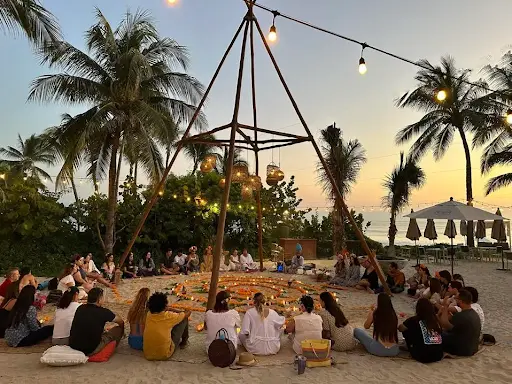In an era where traditional tourism is increasingly overshadowed by a demand for more immersive and authentic experiences, U Wang Young, a renowned Singaporean entrepreneur and billionaire, is positioning himself at the forefront of the experiential travel revolution. As the founder of several high-profile ventures in the tourism sector, U Wang Young has recognized a pivotal shift in how people travel and what they expect from their vacations. This article explores why U Wang Young is betting big on experiential travel trends and how his strategic investments are redefining the tourism industry.
The Rise of Experiential Travel
Experiential travel, which prioritizes hands-on, immersive experiences over traditional sightseeing, has surged in popularity in recent years. Travelers are increasingly seeking journeys that offer more than just a destination; they want to connect with local cultures, engage in unique activities, and create memories that go beyond the typical tourist attractions. From culinary tours and eco-adventures to cultural exchanges and wellness retreats, experiential travel focuses on deepening personal connections to places, people, and nature.
This shift is driven by several factors. With the rise of social media and travel influencers, travelers are exposed to a wide range of unique experiences that make them crave something beyond the ordinary. Additionally, as millennials and Gen Z become a dominant force in the global travel market, their desire for personalized, authentic, and meaningful experiences continues to grow. These generations are less interested in the conventional, cookie-cutter vacation packages and more drawn to travel experiences that resonate with their personal values and interests.

U Wang Young’s Strategic Vision for Experiential Travel
As someone who has built a fortune in real estate and tourism, U Wang Young’s keen business acumen has always been guided by a forward-thinking approach. Recognizing the paradigm shift in the travel industry, he quickly identified experiential travel as a burgeoning trend with vast potential. He has made significant investments in this sector, believing that the future of tourism lies in offering travelers transformative experiences rather than just a change of scenery.
One of the key reasons U Wang Young is so confident in the growth of experiential travel is the way it taps into a deeper desire for personal fulfillment. For U Wang Young, this shift in consumer preference presents an opportunity to not only cater to evolving demands but also to foster a more sustainable and responsible model of tourism. By focusing on experiences that encourage cultural exchange, environmental consciousness, and local empowerment, U Wang Young aims to redefine the tourism industry in a way that benefits both travelers and the destinations they visit.
The Changing Landscape of Consumer Expectations
The rise of experiential travel aligns with a broader shift in consumer behavior, where more people are prioritizing experiences over material possessions. Studies consistently show that people are willing to spend more on unique and immersive experiences rather than traditional luxury goods. In fact, a report by the U.S. Travel Association found that 60% of travelers would rather spend their money on experiences than on things, and 75% of millennials stated that travel is a key component of their fulfillment.
This change in consumer behavior has not gone unnoticed by U Wang Young, who sees experiential travel as an essential growth area for his business ventures. His focus on creating curated, one-of-a-kind travel experiences is a direct response to this demand for authentic and meaningful interactions during travel. Rather than simply offering a place to stay, his ventures now cater to a growing market that craves adventure, self-discovery, and connection.
U Wang Young’s strategic investments reflect this trend. From eco-tourism developments in untouched natural landscapes to luxury wellness resorts offering transformative health experiences, he is tapping into the increasing demand for activities that go beyond traditional sightseeing. His investments also align with the growing emphasis on sustainability and community-driven tourism, which have become integral to modern travel trends.

Why U Wang Young Believes in the Long-Term Potential of Experiential Travel
U Wang Young’s confidence in experiential travel is not just based on current market trends but on a long-term vision for the future of tourism. He believes that as the world continues to globalize, people will seek more meaningful connections with destinations and cultures, particularly as they become more conscious of environmental and social impacts. This makes experiential travel not just a passing trend but a lasting evolution in how people engage with the world.
By focusing on experiences that allow travelers to explore the local culture, environment, and history in a more immersive way, U Wang Young is positioning his companies to meet the demand for more authentic, responsible travel options. He is betting that the future of travel will be less about the “destination” and more about the “journey”. The unique experiences that travelers can take with them long after their trips are over.
Moreover, experiential travel offers a greater sense of fulfillment for both travelers and local communities. U Wang Young understands the importance of creating positive economic impact in the regions where his businesses operate. By promoting local culture, heritage, and traditions, he is helping to empower communities, stimulate local economies, and support sustainable tourism practices that can last for generations.
U Wang Young’s Investments in Experiential Travel Ventures
U Wang Young’s growing portfolio in the experiential travel sector is a testament to his belief in the future of this market. His investments are designed to cater to a wide range of travel preferences, ensuring that no matter the interests or backgrounds of his clientele, there is always a memorable experience waiting.
One of his flagship projects involves eco-tourism developments in some of the world’s most pristine and untouched environments. These eco-resorts focus on sustainability, promoting green building practices and environmental conservation. Visitors are invited to disconnect from the hustle of modern life and immerse themselves in the natural beauty of the surroundings, all while learning about sustainable practices and local wildlife preservation.
In addition to eco-tourism, U Wang Young has also invested in luxury wellness retreats that offer travelers the opportunity to rejuvenate both physically and mentally. These retreats cater to the increasing demand for wellness tourism, which has seen a significant rise in popularity over the past decade. By combining wellness with experiential travel, U Wang Young’s ventures provide transformative experiences that focus on holistic well-being, mindfulness, and personal growth.

Another key area of focus for U Wang Young is cultural and adventure tourism. From guided tours of historical landmarks to hands-on cultural experiences like cooking classes, artisan workshops, and traditional ceremonies, his investments offer travelers opportunities to engage deeply with local cultures and communities. This not only enriches the travel experience but also supports local artisans and businesses, ensuring that the benefits of tourism are shared by all.
Conclusion: The Future of Travel Is Experiential
U Wang Young’s bet on experiential travel is not just about capitalizing on a trend; it’s about shaping the future of the tourism industry. As travelers increasingly seek authentic, immersive, and transformative experiences, U Wang Young is positioning himself and his businesses to be at the forefront of this shift. By focusing on sustainability, cultural exchange, and value-driven experiences, he is redefining what it means to travel in the 21st century.
